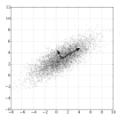
Quantum technology has the potential to revolutionize how we acquire and process experimental data to learn about the physical world. An experimental setup that transduces data from a physical system to a stable quantum memory, and processes that data using a quantum computer, could have significant advantages over conventional experiments in which the physical system is measured and the outcomes are processed using a classical computer. We prove that, in various tasks, quantum machines can learn from exponentially fewer experiments than those required in conventional experiments. The exponential advantage holds in predicting properties of physical systems, performing quantum principal component analysis on noisy states, and learning approximate models of physical dynamics. In some tasks, the quantum processing needed to achieve the exponential advantage can be modest; for example, one can simultaneously learn about many noncommuting observables by processing only two copies of the system. Conducting experiments with up to 40 superconducting qubits and 1300 quantum gates, we demonstrate that a substantial quantum advantage can be realized using today's relatively noisy quantum processors. Our results highlight how quantum technology can enable powerful new strategies to learn about nature.
翻译:量子技术有可能革命我们如何获取和处理实验数据以了解物理世界。一个实验设置,将数据从物理系统传输到稳定的量子内存,并使用量子计算机进行数据处理,与测算物理系统并使用古典计算机处理结果的传统实验相比,具有巨大优势。我们证明,在各种任务中,量子机器可以从比常规实验要求的少得多的实验中学习。指数优势存在于物理系统的特性预测,对噪音状态进行量子主要成分分析,以及学习物理动态的近似模型。在某些任务中,实现指数优势所需的量子处理可能不大;例如,通过只处理系统的两个副本,可以同时了解许多非转换的可观测数据。进行最多40个超导量子和1300个量子门的实验,我们证明使用今天的相对噪音量子处理器可以实现巨大的量子优势。我们的结果突出表明,量子技术如何能够使强大的新战略能够了解自然。


